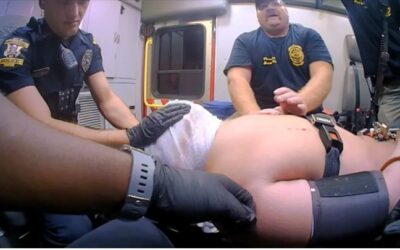Michigan has a crime victim compensation fund. You can contact them using the various links on this page. This post is just to provide you with information. We do not provide any services for this topic.
Crime Victims
Victims of crime often face lasting repercussions that extend far beyond the initial act, affecting them physically, emotionally, and financially, but it is important to remember that you are not alone in this journey.
If you or someone close to you has been affected by a crime, you may be eligible for Crime Victim Compensation coverage for certain expenses.
This program provides assistance for out-of-pocket medical costs, lost wages, funeral expenses, counseling services, and other financial burdens incurred as a direct result of the crime.
What is Crime Victim Compensation?
If you or someone you care about has been affected by crime, you may be eligible for compensation to help cover specific expenses related to the incident.
This program provides financial assistance for out-of-pocket medical expenses, lost wages, funeral costs, counseling services, and other related expenses incurred by individuals who have suffered harm as a direct result of a crime.
Crime Victim Compensation serves as the last option for financial support, meaning you must first exhaust your private insurance and any available public funds to qualify for this compensation.
Do You Qualify?
Who is considered a victim?
The following individuals may be considered a victim and qualify for crime victim compensation:
- A person who was physically, emotionally, psychologically, or mentally injured as the direct result of a crime.
- A sexual assault victim.
- A person injured while trying to help a crime victim.
- Eligible individuals with out-of-pocket expenses as a direct result of a crime.
- A Michigan resident injured in another state that doesn’t pay compensation for a nonresident.
Who is considered a claimant?
There are a number of definitions of eligible claimants under the law in Michigan, including:
- A victim.
- A person related to the victim by blood or affinity to the second degree, including child born after death of deceased victim.
- A person who was in a dating relationship with the victim at the time of the crime.
- If the victim was a guardian or primary caregiver to an adult who is physically or mentally incapacitated, that adult who is physically or mentally incapacitated.
- If the victim was a guardian or primary caregiver to a minor, that minor.
- If the victim is a minor or is an adult who is physically or mentally incapacitated and a dependent, the guardian/caregiver to that victim.
- A guardian/caregiver to a victim when the victim was a minor.
- A person who assumes legal obligation or voluntarily pays for a victim’s funeral/burial expenses.
- A person who, at the time the crime occurred, was a household member with the victim (an individual who resides in the same dwelling unit).
- May require proof of permanent residence to demonstrate the individual is eligible, including a lease agreement, utility bill, license registration, document showing mailing address, etc.
- A person who was previously a household member of the victim for a period of not less than 2 years AND who is related to the victim by blood or affinity.
- A dependent who suffers loss of support as a result of the death of the victim who died as a result of the crime.
Covered Crimes
A crime considered eligible for Crime Victim Compensation under Michigan law is defined as “A crime committed under the laws of Michigan, the United States, or a Federally recognized tribe in Michigan, including pregnancy or death, or that poses a reasonably perceived or actual threat of injury or death within Michigan.”
Examples of eligible crimes include:
- Homicide
- Robbery
- Assault
- Carjacking
- Hate Crime
- Kidnapping
- Child Abuse
- Domestic Violence
- Sexual Assault
- Human Trafficking
- Stalking
- Elder Abuse
- DWI/DUI
- Terrorism/Mass Violence
Acts of international terrorism and crimes committed against a Michigan resident in another state (that does not have a victim compensation program) that would be considered a crime under Michigan law is also be considered an eligible crime.
Eligibility Requirements
The following are required for a victim/claimant to be eligible for Crime Victim Compensation benefits:
- An individual must be emotionally, physically, psychologically, or mentally injured as a direct result of a crime.
- If the victim is a minor, deceased, or mentally incapacitated, a claimant can file a claim for expenses incurred as a result of the victim’s injuries.
- A victim who experiences a crime that inflicts bodily harm – including pregnancy or death – or a reasonably perceived or actual threat of injury or death under the laws of the United States, State of Michigan, federally recognized Tribal land, or in another state where the crime committed would be considered a crime under Michigan law.
- An act of international terrorism committed outside the territorial jurisdiction of the United States would also be considered eligible.
- The crime must be reported to law enforcement (waivers may apply).
- If the crime was a sexual assault, then a sexual assault forensic exam may be used in lieu of reporting to police.
- The victim or claimant must cooperate with law enforcement officials in the investigation and prosecution of the case (waivers may apply).
- Cannot be criminally responsible/an accomplice to the crime or involved in misconduct that contributed to the injury at the time of the crime.
- At least $200 of out-of-pocket loss(es) OR at least five (5) days of lost wages or support.
- File a claim within five years from the date of injury or discovery (waivers may apply).
- Seek reimbursement from other sources (health insurance, Medicaid, short/long term disability, etc.) before applying for compensation benefits.
Questions?
If you have questions about the Crime Victim Compensation program or the application process, call or email the Crime Victim Compensation program for assistance. If you need help completing your application, contact your local county prosecutor. You can search for your local prosecutor by clicking here.
Here is a Michigan Law
WILLIAM VAN REGENMORTER CRIME VICTIM’S RIGHTS ACT (EXCERPT) Act 87 of 1985
More Rights You Should Know

Do Passengers in a Vehicle have 4th Amendment Rights?
Do Passengers have 4th Amendment Rights?Michigan Supreme Court Limits Police Ability to Search Passenger Property in CarsBackground Mead was a passenger in a car and had just met the driver, who offered him a ride. When the police stopped the vehicle and ordered both...

SCOTUS: No separate hearing required when police seize cars loaned to drivers accused of drug crimes
SCOTUS: When police seize cars loaned to drivers accused of drug crimes it does not necessitate a separate preliminary hearing.The U.S. Supreme Court has ruled against two women who loaned their cars to others arrested for drug crimes while using the vehicles, leading...
Other Articles
AG Nessel joined 21 attorneys general to regulate the sale of firearms
Extreme Risk Protection Order to prevent individuals from possessing or owning a firearm for eight years following their conviction. That legislation was signed into law by Governor Gretchen Whitmer in November of 2023.Michigan Attorney General Dana Nessel has joined...
Michigan DUI Laws and Consequences – First Offense
First Offense DUI in Michigan: Laws and ConsequencesFacing a first offense DUI in Michigan can be daunting as the implications are significant and the legal landscape is complex. Understanding the laws surrounding Operating While Intoxicated is essential, as these...
Michigan Supreme Court to Hold Public Administrative Hearing
On September 18, 2024, the Michigan Supreme Court will conduct a public administrative hearing, providing an opportunity for citizens and legal professionals to engage directly with the state's highest court. This hearing, held via Zoom and livestreamed on YouTube,...
Nuclear waste headed to southeast Michigan landfill
What happened to the nuclear waste from the Manhattan Project? It's coming to Michigan so New York can be a cleaner place.August 2024, the U.S. Army Corps of Engineers is transporting nuclear waste from the Manhattan Project (Read it) to the Wayne Disposal facility in...
Video kept from family shows police force not drugs killed son
police and paramedics inflicted “inhumane acts of violence”A mother has filed a federal lawsuit claiming that, while her son was experiencing a seizure in his Tennessee apartment, police and paramedics inflicted “inhumane acts of violence” on the 23-year-old instead...
What could happen when you click the – I agree – box?
Wrongful death suit against Disney serves as a warning to consumers when clicking ‘I agree’A wrongful death lawsuit involving Walt Disney Parks and Resorts highlights the critical importance for consumers to meticulously review the fine print before registering for a...
4th Circuit says – Assault weapons can be banned
This case is about whether the Act’s general prohibition on the sale and possession of certain “assault weapons,” are unconstitutional under the Second Amendment. An en banc federal appeals court upheld Maryland’s ban on assault-style weapons in a 10-5 decision...
Court Ruling – No bonus for growing weed
COURT RULING – SORRY NO BONUS FOR GROWING CANNABISA marijuana farm worker is unable to succeed in his breach-of-contract lawsuit regarding a $100,000 bonus he claims to be owed for producing a healthy harvest of 1400 pounds of dry cannabis crop as the contract is...

















